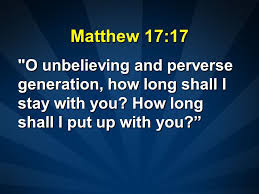A distraught father had brought his demon-possessed son to Jesus for healing. From Mark’s narrative, we learn that Jesus’ disciples had earlier tried and failed and were now embroiled in a heated exchange with some religious leaders. All this while, as the present tense indicates (Matt 17:15), the father is in continual agony. As Jesus surveys the setting, he responds, “You unbelieving and perverse generation, how long shall I stay with you? How long shall I put up with you?” (Matt 17:17). I believe Jesus’ response was more of anguish and dismay rather than judgment and condemnation. He was more hurt than angry that things had not gone well. The words indicate he may well have been addressing everyone there, not just his disciples. That’s what hurt him: no one seemed to have faith. The father, disciples, religious leaders, bystanders didn’t have faith: nada, zilch, zero, abu pun tidak ada. It must have been a very distressing moment for Jesus to see the lack of faith all around coupled with the powerlessness of his disciples. They had seen his miracles first-hand. They too performed miracles in Jesus’ name, casting out demons and healing the sick. But here the father says of them, “but they (the disciples) could not heal him” (matt 17:16). They were powerless.
I wonder if this picture of powerlessness of Jesus’ followers can be still carried over into our 21st Century church. Church literally means “a called-out assembly of people”, called-out to tell the world the difference Jesus makes. We gather to worship and honour our glorious Lord Jesus, not for our own social needs or entertainment. We take on different values from the world as we adopt the values and virtues of Christ and a desire to walk with God and in his ways. We keep his truths in our hearts. It is when we do that as a pattern of our life that we have power. A church exists to offer hope to a dying world. It promises others help for their greatest need – a solution to sin. It testifies of a Saviour who loves all without reservation and helps all to put their broken life together again. I can say this because I have been there, experienced that.
Yet, I can’t help but see that the powerlessness of these disciples are a picture of today’s church. The regular picture of today’s church is well-dressed people with money. Of course, to the world, when you are rich, you are seen as powerful. Look at churches today. Despite many churches undergoing persecution, most have nice facilities to meet in, especially the city churches. Many have the financial muscle to employ the best preachers to fill the pulpit and administrators to run the church. But although we have financial power, the church has not really been an influence in the world. Past reputation does not necessarily guarantee power and influence. Not when we compare today with the previous centuries where its Judeo-Christian heritage exerted great influence on the social, moral and legal fabric of the community. When I was in Adelaide, many years back, I saw a sign in Hahndorf, a town settled by German settlers about 175 years ago. It probably has the most delicious pork knuckle I’ve eaten. But what caught my eye was a shop sign saying, “no policemen were required and the pastor’s words was law; in fact we looked upon his as our Kaiser.” Today, how the mighty are fallen, aggravated by the scandals of the modern-day church. Further, statistics indicate more people are calling themselves Christians but do not attend church. Reputation does not equal power. The disciples too had a reputation as followers of the miracle-working Jesus. So the father came to seek their help. But reputation is not spiritual power. They failed and were ridiculed for their lack of power.
When I was in the Helping Hand, there was this resident who was constantly relapsing. Each time, he came in, he would be a good example of Christ-likeness but he would go back to drugs after discharge. He regularly shared the Gospel with his non-believing wife. But his wife wouldn’t believe in Christ. She said to him, “I cannot believe in your Jesus because he doesn’t have any power. After all, he cannot change your drug habits.” Are we like that when the world examines us as we share the Gospel? Look at the church with its money, sex and conflict scandals in the media. Will the watching world say, “I want to believe in your Jesus but I don’t see his power changing your lives.” Will they look at us and then then like the distraught father say, “but they could not...” But if we are powerless today, there is hope. T B C.
One Campaign SG2021 – Reading the Gospels, day 9, Matt 17-19. Reflection from Matt 17.

Comments
Post a Comment